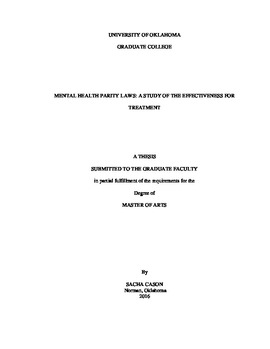| dc.contributor.advisor | Peck, B. Mitchell | |
| dc.contributor.author | Cason, Sacha | |
| dc.date.accessioned | 2016-12-16T18:46:10Z | |
| dc.date.available | 2016-12-16T18:46:10Z | |
| dc.date.issued | 2016-12 | |
| dc.identifier.uri | https://hdl.handle.net/11244/47071 | |
| dc.description.abstract | To date, research examining the effects of comprehensive state mental health parity on the receipt of substance abuse treatment is limited. Comprehensive state mental health parity laws address the inequality between the receipt of treatment between mental health services and medical/surgical services more systematically than federally mandated mental health parity laws. The goal of comprehensive state parity laws is to reduce barriers in place that affect the receipt of substance abuse treatment. In this study, I sample twenty states in order to identify the treatment gap rate for substance use disorders in percentages and the per capita state expenditures for mental health treatment in average dollars per person. The treatment gap percentage is the ratio of the total number of individuals identified as needing, but not receiving treatment for substance use disorders within the last year divided by individuals identified as having a substance use disorder in the past year. The twenty states sampled included ten with comprehensive state mental health parity laws and ten states with the federally mandated mental health parity laws, the purpose of this sample is to identify if comprehensive state mental health parity resulted in a reduced treatment gap rate. The second measure is to identify if states with comprehensive mental health parity reflected an increase in expenditures for substance abuse treatment per person. The result of the research conducted did not find a significant difference for the substance use disorder treatment gap with the exception of the age group 12-17 year olds. Second, state expenditures per capita on substance abuse treatment was significant for states with more comprehensive state mental health parity laws. | en_US |
| dc.language | en_US | en_US |
| dc.subject | Mental Health Parity | en_US |
| dc.subject | Substance Use Disorder | en_US |
| dc.subject | Treatment Gap | en_US |
| dc.title | MENTAL HEALTH PARITY LAWS: A STUDY OF THE EFFECTIVENESS FOR TREATMENT | en_US |
| dc.contributor.committeeMember | Ketchum, Paul | |
| dc.contributor.committeeMember | Duncan, John | |
| dc.date.manuscript | 2016-12 | |
| dc.thesis.degree | Master of Arts | en_US |
| ou.group | College of Liberal Studies | en_US |
